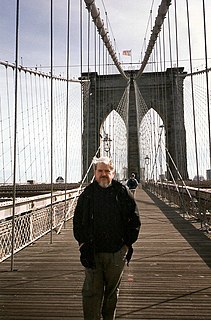A Quote by Harry Markowitz
If the investor doesn't have enough time and skill to investigate individual stocks or enough money to diversify a portfolio, the right thing to do is to invest in exchange-traded funds that give you exposure to asset classes. It does make sense for the individual investor to think in terms of holding individual asset classes.
Related Quotes
I don't invest in the stock market. I did it a long, long time ago when I was really young, and I got involved in all the investigations and all the prosecutions, and I felt it was better if I didn't make individual investments. So I'm invested in funds, but not in individual - not in individual stocks.
We're mathematically past the point where the accumulation of individual actions can add up quickly enough to make a difference. The individual action that actually matters is not being an individual. It's joining together with other people in groups large enough to change the political dynamic around climate change.
we have complaints that institutional dominance of the stock market has put 'the small investor at a disadvantage because he can't compete with the trust companies' huge resources, etc. The facts are quite the opposite. It may be that the institutions are better equipped than the individual to speculate in the market.But I am convinced that an individual investor with sound principles, and soundly advised, can do distinctly better over the long pull than large institutions.
In the 40 years I've been working as an economist and investor, I have never seen such a disconnect between the asset market and the economic reality... Asset markets are in the sky, and the economy of the ordinary people is in the dumps, where their real incomes adjusted for inflation are going down and asset markets are going up.
The individual investor should act consistently as an investor and not as a speculator. This means ... that he should be able to justify every purchase he makes and each price he pays by impersonal, objective reasoning that satisfies him that he is getting more than his money's worth for his purchase.
Ask yourself: Am I an investor, or am I a speculator? An investor is a person who owns business and holds it forever and enjoys the returns that U.S. businesses, and to some extent global businesses, have earned since the beginning of time. Speculation is betting on price. Speculation has no place in the portfolio or the kit of the typical investor.


































